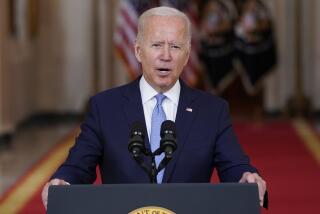Bank to Aid Emerging Democracies Wins OK : Development: The institution will start with $12 billion in capital. Eastern Europe--and the Soviet Union--could get loans by early next year.
- Share via
PARIS — The United States and 39 other countries joined Tuesday in formally creating a development bank designed to help the emerging democracies of Eastern Europe--and the Soviet Union--finance their transition to freer-market economic systems.
The signing ceremony, which climaxed more than six months of debate, both among the Western donor countries and between the West and the former East Bloc, is expected to pave the way for initial loans by the new institution by early next year.
The bank, to be known as the European Bank for Reconstruction and Development, was proposed last summer by French President Francois Mitterrand and quickly endorsed by most other West European governments. Mitterrand predicted Tuesday that it will become “a major world institution.”
The Bush Administration was lukewarm to the idea at first, arguing that sufficient lending capital was available through the World Bank and the International Monetary Fund. But eventually it agreed to join, partly to help maintain U.S. influence in Eastern Europe.
The institution will begin with about $12 billion in capital. West European countries will hold 51% of the shares and voting power, the United States 10% and Japan 8.5%. The Soviet Union, both a shareholder and a borrower, will have a 6% share.
In deference to Mitterrand, the bank’s first president will be Jacques Attali, the Socialist Party economist who has been the French president’s top adviser the past decade. However, in a compromise worked out by European countries, the bank’s headquarters will be in London.
In a surprise move, the group creating the bank announced Tuesday that an American will be asked to fill the vice president’s slot. U.S. officials said the appointment will be announced in a few weeks.
The developments came as, separately, senior U.S. officials arrived Tuesday for a meeting of the 24-country Organization for Economic Cooperation and Development. It traditionally serves as a prelude to the annual seven-nation economic summit.
The two-day session, which begins today, is expected to see a sharp clash between the United States and its economic allies over how far to go in urging prompt action in the Uruguay Round, the global trade-liberalization talks under way in Geneva.
There is also likely to be a row over how far to tighten restrictions on the use of so-called tied aid--the practice under which an industrialized country conditions foreign aid on a promise that the recipient country will purchase its exports.
The United States wants the allies to join in issuing a strong call for action at the Geneva trade talks, particularly on phasing out worldwide agricultural subsidies and sharply limiting tied aid. But European countries are pressing for a slower pace.
U.S. Trade Representative Carla A. Hills, a member of a high-level U.S. delegation, underscored Washington’s position Tuesday, saying that strong language is needed to help push the trade talks along. As it stands, she said, the United States is “out in the jungle” almost alone in seeking some reforms.
This year’s seven-nation economic summit will be July 9-11 in Houston. Besides the United States, participants will include the leaders of West Germany, Japan, Britain, France, Italy and Canada. Officials of the European Community will also take part.
At U.S. insistence, the East European development bank will earmark at least 60% of its loans for bolstering the private sector in Eastern Europe and the Soviet Union. The other 40% will finance infrastructure, environmental cleanup or reform of state-owned firms.
Washington also won an agreement to limit Soviet borrowing to the amount of hard cash that Moscow is expected to contribute to the bank--about $720 million--at least for its first three years.
The Soviet borrowing limits will be reviewed after that, but the rules can be changed only by a majority that amounts to 85% of the bank’s total weighted voting. This means that the United States and Japan, for example, together could veto a plan they did not like.
In addition, money loaned to Moscow must be used solely to finance projects in the private sector, to provide technical assistance or to help state-owned enterprises that are converting to private businesses or are operating as competitive corporations.
The United States had feared that unless the new bank placed restrictions on its lending to the Soviet Union, Moscow’s huge demands would drain off too much of the institution’s resources, leaving too little for the emerging Eastern European democracies.
With the West Europeans pressing for looser limits on lending to the Soviets, the Bush Administration appealed to Moscow to agree to tighter restrictions on its own. The ploy worked, and the fundamentals of the accord were ironed out at a meeting April 9.
More to Read
Sign up for Essential California
The most important California stories and recommendations in your inbox every morning.
You may occasionally receive promotional content from the Los Angeles Times.













